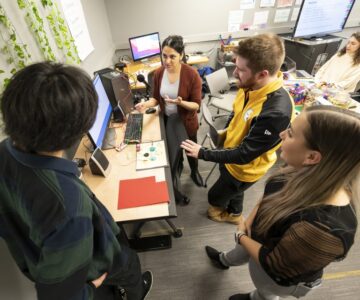EDUC 2302 Digital Literacies, Schooling, and Identity
This course will examine the relationship between digital literacies, schooling, and identity in relation to an evolving digital media landscape. We will consider what it means to read and write, the world and the word, in a digitally constructed reality. We will collaboratively explore the deictic, participatory, networked, global, and multimodal nature of digital literacies and the implications for classrooms and other educational contexts. To do so, we will critically examine how literacies are situated and how these socio-cultural understandings illuminate issues of power and privilege. This course will be grounded in critical praxis, and therefore you will learn to compose and deconstruct a range of digital artifacts (e.g., digital stories, games, podcasts), engage in critical analysis of digital artifacts, and think about how to design digital experiences to nurture learning and literacy.
EDUC 2300 Digital Media for Learning
This course provides opportunities for graduate learners to explore, examine, reflect, and discuss critical learning theories that inform how we select and use digital media and technology. Through discussion and reflection, students will explore different digital integration models. It enables you to consider digital media based on four guiding principles “place, pedagogy, praxis, and possibility” (Bell, 2021). We will examine the digital media application and equity, accessibility, and criticality. You will have the opportunity to disseminate your strategies and experiences using digital media and technology. You will create content using select digital media and technology, receive feedback from instructors and colleagues, and reflect on how you could revise your creations.






